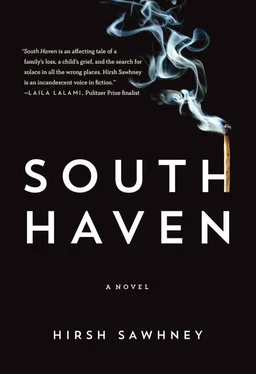Siddharth was sitting on his bed drawing for the first time in a while, attempting a sketch of a Michigan basketball player taking a jump shot. He planned on turning it into a birthday card for Arjun. Mohan Lal was making a racket in the kitchen, preparing a huge Indian spread for Barry Uncle. The thought of daal and rice turned Siddharth’s stomach.
When Marc got home from football camp, he barged into the room and started rummaging through the closet.
Siddharth looked up from his drawing. “What’s the plan?”
“The plan?” said Marc. “The plan is, I’m sleeping at Andy’s.” He fished out a flask of Southern Comfort from one of Siddharth’s winter boots, and then a can of spray paint from inside a board game.
Siddharth had no idea that either of these things were in his closet. He said, “You’re kidding me — graffiti?”
Marc gave the can a rattle. “Nah, makes a good blowtorch.” He cocked his head to one side and cracked a smile. “You know what?”
“What?” said Siddharth, feeling hopeful.
“I got a bottle of Bacardi in there — up top, behind that old camera. I think it’ll do you some good.”
Soon Marc left with his mother, and Siddharth tried to return to his drawing. He wondered how he could make things go back to the way they were with him and Marc. When Marc had first gotten back from Florida, everything seemed fine. He’d even invited Siddharth to the mall one day and helped him pick out clothes, telling him what would be cool for junior high. After swearing him to secrecy, Marc confessed that his father’s girlfriend, Madeline, was pregnant.
“Congratulations,” said Siddharth.
“Congratulations? This is bad, Sidney. Very fucking bad.”
“Why?”
“Cuz Rachel and my dad — they’re past the point of no return.”
Once Marc’s grounding was officially over, he’d started spending all of his time with Andy Wurtzel, a fourteen-year-old from his junior high school. Marc invited Siddharth out a few times with them, but Siddharth couldn’t understand why Marc was so fond of Andy. The kid seemed dumb, and he looked like a bulldog.
When Andy and Marc were together, they talked about stupid things like football, or whether pussy tasted better in the morning or at night. The pair had a penchant for shoplifting, swiping clothes or compact discs or bottles of perfume that Marc later gave to Dinetta Luciani. Siddharth wished he could be more like them, but stealing made him nervous. When he tried to talk like them, the words got stuck in his throat, and he felt they could see right through him.
Sometimes Marc and Andy met up with kids who he suspected were drug dealers, like Corey Thompson, a grubby ninth grader who attended the South Haven branch of Eli Whitney, Siddharth’s future junior high. One day, Corey stole a Gamecocks cap from the mall, which he later planted on Siddharth’s head. He told him it fit like a glove and that he should keep it. Siddharth started wearing it every day, but he was always uneasy that someone might know it was stolen.
As he struggled to sketch the biceps of his basketball player, Mohan Lal knocked on the door.
“What?”
“Dinner,” said his father.
“I’m not hungry,” he lied.
“I made you something special. Come and eat.”
As usual, Siddharth ate his spaghetti and garlic bread on his three-legged Kashmiri table. Ms. Farber got home around seven thirty wearing a summer dress that made her breasts look bigger than they actually were. She said, “Siddharth, honey, how about putting some newspaper down? I just cleaned the carpet yesterday.”
Barry Uncle let himself in twenty minutes later. “Greetings, good evening!” he shouted. He shook Mohan Lal’s hand and then gave Ms. Farber a kiss on each cheek. “Rachel, you look especially lovely tonight. I still can’t figure out why you’re settling for my plump friend over there.”
She turned to Mohan Lal and winked at him, then pinched the sleeve of Barry Uncle’s burgundy shirt. “This color, Barry, it’s just so you.”
Siddharth snorted. Barry Uncle’s shirt was too shiny, and the sight of his chest hairs peeking through the open top buttons made him want to hurl. And as for Ms. Farber, she could be a real hypocrite sometimes. When Barry Uncle wasn’t around, she called him a chauvinist, or a know-it-all. But she kissed his ass in person, asking him all sorts of questions about Mohan Lal’s family, about India. Barry Uncle had told her about Mohan Lal’s big-shot brother, the one who bribed government ministers and slept with flight attendants. But she was more interested in family history. She once asked him if he had been a refugee, like Mohan Lal.
“Yes, indeed,” Barry Uncle responded. “You wouldn’t believe the things we saw — the things those Muslims did to our people.”
“Chief, you were in diapers,” said Mohan Lal.
“Boss, you may be the intellectual, but I have a photographic memory.” Barry Uncle grew serious. “And even a baby can remember what they did to Chacha-ji.”
“Enough,” said Mohan Lal. “Now’s not the time for such talk.”
* * *
Upon Mohan Lal’s suggestion, the adults seated themselves in the family room. Siddharth considered heading to the guest room, where Marc had set up a ten-inch TV that he’d salvaged from his father’s scrapyard, but there was no cable there, and he wasn’t in the mood to be alone.
After a little small talk about Ross Perot and Bill Clinton, the conversation returned to India. Barry Uncle said that the country’s main problem was its astronomical population growth, for which the Muslims were to blame. “These Mussulman breed like rabbits,” he said. “They have no loyalty to any nation — just to their bloody prophet.”
“Forget it, yaar,” replied Mohan Lal. “The real problem is the Congress and those bloody Nehrus. They’re the ones who let the Muslims get away with everything — just for their bloody votes. They’re a bunch of dictators — the reason why India is a sham democracy.”
“You said it, boss,” said Barry Uncle. “And that’s why we gotta get together and support a new party. I’m telling you, the BJP is gonna get India out of the Stone Age. They’ll make India a land where people can be proud to call themselves Hindus.”
Ms. Farber had been looking on in silence and smiling, but she finally chimed in: “It’s like I’m always telling Marc — if you really want success, you’ve got to love yourself, and that means loving your roots. Embracing your religion, your ethnicity.”
“Smart lady,” said Barry Uncle. “Rachel, hopefully some of your wisdom will rub off on your man over there.”
Your man . The words rang in Siddharth’s ears.
Ms. Farber was beaming. “Oh, he’s doing just fine in the wisdom department.”
Barry Uncle said Mohan Lal wasn’t dumb, just tight-fisted. “I’ve been asking him for a little cash — to get things rolling back home. But this man, he’s a Bania — that’s our version of the Jews.”
“I’ll pretend I didn’t hear that,” said Ms. Farber. She turned to Mohan Lal. “Mo, Shelly and I — that’s my ex-husband, Barry — we used to give to a charity in Israel. Let me tell you, when we cut that check every year, it felt so good — like I was really making a difference.”
When Barry Uncle asked how Mohan Lal’s book was progressing, Siddharth lowered the volume. Since the last letter from Walton, Mohan Lal had been working in the yard and cooking, but he hadn’t written a single word. Siddharth knew this wasn’t a good thing. When his father wasn’t writing, he got grumpy. He became mean.
Mohan Lal told Barry Uncle that things were going fine, which caused Ms. Farber to speak up: “Mo, he’s your best friend. You should tell him.”
Читать дальше












